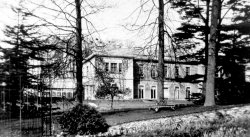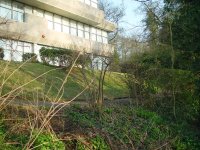|
Early History
Ridge House
The Gardens
Ridge Families
Topography
Maps
Time Tour
Picture Gallery
|
|
 |
| |
 Ridge House
This was a mansion house which remained in existence until the mid 20th century. It was surrounded by pleasure gardens. The year in which it first appeared is as yet unknown. It is not included on Isaac Taylor's map of 1777 - the ancient camp which has already been mentioned is shown instead. However, its absence from the map does not necessarily indicate its absence in the landscape. It could simply be that the map does not show the area in sufficient detail to include it.
The architecture of Ridge House suggests a building established in the late 18th/early 19th century. But this in itself is not conclusive either. We may be looking at the renovation or the complete rebuilding of an earlier residence. It is interesting to note that the style of the house is similar to that of other large houses in the area - Yate House and Yate's former rectory (the site of the latter is now occupied by Canterbury Close). These residences were built towards the end of the 18th century.
Bryant's map of 1824 shows the house and pleasure gardens. Incidentally, the map seems to indicate a general absence of woodland in the area at this time.
The Demise of Ridge House
By the 1920s, the neighbouring quarry was making life noisy for the Burges family. Millicent Burges therefore left The Ridge and moved to Horton Hall. The house was left unoccupied, although the family who occupied the Lodge at that time continued to use the gardens for commercial purposes.
 In 1925, the quarry company J Arnold & Son acquired the house and used it as office space. Later, ARC took possession of the quarry site and adopted the premises as their headquarters. But the quarrying was getting too close for comfort. It was reported that, following blasting operations, rocks would fall through the roof. By the early 1960s, the house was boarded up. In 1925, the quarry company J Arnold & Son acquired the house and used it as office space. Later, ARC took possession of the quarry site and adopted the premises as their headquarters. But the quarrying was getting too close for comfort. It was reported that, following blasting operations, rocks would fall through the roof. By the early 1960s, the house was boarded up.
Eventually, it was replaced by the modern building that stands there today. But it inherits a rich legacy for - as we have seen - the original building had provided a home for several extraordinary families. It is curious that there seem to be links between these families - connections with the legal profession and the anti-slavery movement are of particular significance.
Thanks to Sharon Eubank
Return to top of page
|
|
| |
|

